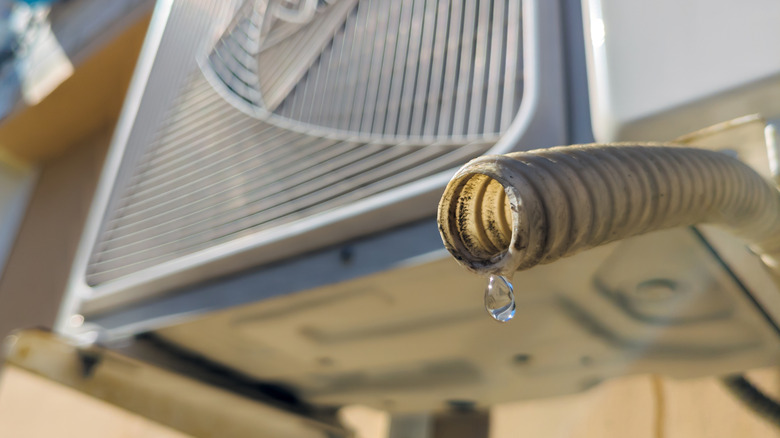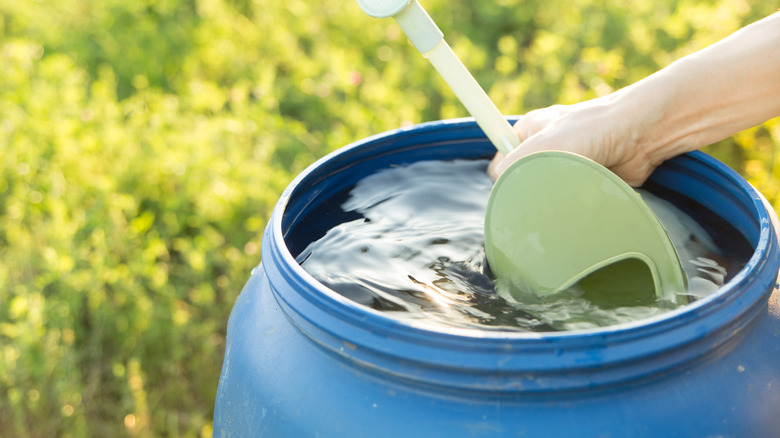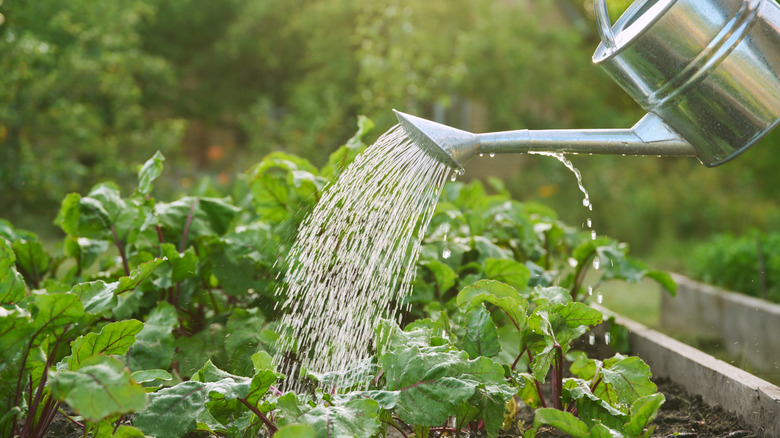Don't Dump Air Conditioner Water When You Can Reuse It In The Garden Instead
The steady drip coming from your air conditioner can become an easy source of irrigation water that could nourish your garden. A typical air conditioning unit produces around 5 to 20 gallons of condensate a day, depending on your local humidity levels. All that wasted water could be collected and repurposed with very minimal effort. The water forms when warm air passes over the cold evaporator coils inside your AC unit, causing moisture to form like morning dew on grass. This process distills the water, leaving behind most impurities found in typical tap water. Gathering it is simple, attach a hose or pipe to your air conditioner's drain line and direct the flow into a clean container. It's best to put this container in a shady area to avoid any possible algae growth.
The collected water is great for irrigating plants that thrive in acidic soil, like azaleas and magnolias, since the condensation tends to be slightly acidic. It's also perfect for container plants and seeds since pure, chemical-free water promotes healthy root development. Try to use the water within 24 to 48 hours to prevent stagnation, and distribute it evenly around plant bases with a watering can. During the peak summer season, an average home's air conditioner can produce enough condensation to water a small vegetable garden daily.
Why air conditioner condensation is great for gardeners
Air conditioner condensation offers many advantages over standard tap water from your hose. Unlike tap water, which may contain chlorine or fluoride, AC water is basically distilled, free of salts, minerals, and chemicals that can build up in soil over time. This makes it very valuable for houseplants or sensitive plants that can develop leaf tip burn from unknown tap water additives. The water is naturally soft and can help prevent limescale deposits that can clog up drip irrigation systems. However, you should know that there are ways to easily remove limescale with some simple household ingredients.
The temperature of the AC water is also another benefit. Typically cooler than ambient indoor air, it can help keep soil temperatures lower during heat waves. This, in turn, will help reduce the heat stress on your plant roots. During water restrictions or droughts, this free byproduct can keep gardens thriving when other sources need to be limited. If you live in an older home, AC water can be an easy source of clean water without any threat of lead or other contaminants that may leach from old pipes.
How to safely use air conditioner water in your garden
While your air conditioner water offers many benefits, there are a few precautions you should be aware of. The water may contain trace metals from the evaporator coil, typically copper or aluminum, which is not great for edible crops unless you filter it. In coastal areas, where AC units work with a lot of salty sea air, condensation may carry some sodium residue. Mixing this water with fresh water can help, or only using it on salt-tolerant plants might prevent soil issues. The lack of minerals in air conditioner condensation also means that exclusive long-term use could potentially deplete your soil's nutrients. Occasionally combining this method with a strong DIY compost tea or fertilizer can help combat this problem, though.
Most negatives of air conditioner water can be handled with some simple fixes. Adding a small mesh bag of peat moss to your storage container will gently acidify the water more for your acid-loving plants. If you're using it in vegetable gardens, mixing the water with other water sources will help lock in a good mineral balance. You can also install a sediment filter in the container to catch any bits you don't want mixing into your soil. Be sure to keep your AC unit clean as well. Regularly flushing the system will help prevent microbial growth that could contaminate the water. With just a few adjustments, your air conditioner can produce plenty of usable water that not only saves money and resources but also gives your plants the hydration they need to thrive.


